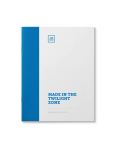Made in the Twilight Zone
$75.00
“If not for the last minute, nothing would get done.”
The Mishna (Avot 5:6) lists a number of unique items created on that first Friday during Bein Ha-Shmashos (the twilight hour between shkia and tzeis hakochavim).
If our Shabbos observance — characterized by abstaining from creative labor — is to be a reflection of Hashem’s abstention from creation, why must we not engage in creative labor during Bein Ha-Shmashos?
Some fascinating perspectives culled from the Midrash, Kabalah and Chassidus.
| Language | English |
|---|---|
| Paper Type | Research Paper |
| Pages | 26 |
Related Products
The Blowing of the Shofar: Reasons and Significance
One of our most festive Holidays, an all-out celebration of the Torah, has neither Scriptural nor Talmudic basis.
These sources trace the development of this custom as well as many others related to Simchas Torah:
The yearly schedule for completing the reading of the Torah, the ensuing celebration and unique liturgy read on this occasion, the custom of dancing and circling the Bima seven times, other celebratory expressions such as marching with candles, torches and much more.
Also includes a collection of anecdotes regarding the importance of experiencing joy during this event.
(Hebrew)
Shabbos and Yom Tov are both so precious to the Jewish people that many Jews welcome them in early. How does this fit in with the prohibition of adding to a Mitzvah? What is the source of this practice? Study all the opinions and Halachic ramifications.
(Hebrew)
Given that both Haman and ‘the Manna’ are spelled the same,
is there any deeper connection between the two?
Legend of a Cookie – The Purim cookie. Three corners, folded to swathe a filling. Supposedly it is named after the wicked Haman from the Purim story. How is this cookie reminiscent of the wicked Haman? (Sources)
Have you set up “Hey Siri!” on your iPhone yet? How about the Amazon Echo to obediently adjust your thermostat, turn on your lights and play your favorite music – all by the sound of your voice?
During the week this might be great, but what about on Shabbos? Do the laws proscribing creative activity extend to actions that result from our verbal expression? What if some technology was devised to act upon your thoughts?
Related: “An Uplifting Shabbos” and “Motion-Triggered Sensors”
One of the the central themes of Chanukah is Pirsumei Nisa, the public display and celebration of the holiday. Around the world, Menorah’s are kindled in Malls, at City Halls and all sorts of public places. May one recite the traditional blessing over the Chaukah lights if they are being lit in the city square and not in the privacy of one’s home or Shul?
The water used to bake Matzah must be mayim shelanu—water that had been drawn in the evening and left to cool overnight. What is the halachic background for this requirement?
Further restricting an already slimmed down Pesach diet is not something anybody would eagerly embrace. But the Jews of medieval Ashkenazic communities adopted the stringency of avoiding the consumption of legumes throughout the duration of Pesach. The question is, why? How was this ban treated for the centuries that have since passed? Was it adhered to equally in times of prosperity and adversity?
In response to the buzz surrounding #GefilteFishGate, we shared the following material (free) on our social media feed on Facebook and Twitter
This is where we stand on #GefilteFish
Follow us there for more exclusive content!
Shabbos is a day of physical delight and spiritual rejuvenation. Each of the Shabbos meals is designed with taste and splendor, which elevates the simple act of eating to being a Heavenly experience.
Of what mystical significance are the three halachically-mandated meals on Shabbos? How does Jewish mysticism transform our appreciation for the Shabbos in general, and our perception of the third Shabbos meal in particular?
The mandate to rest on Shabbos also precludes having work done for us by gentiles, under specific conditions.
May one send Priority, Express or 2nd Day Mail on Friday? What about ordering through Amazon Prime?
What may one say (or dictate) when scheduling shipping without violating Shabbos by proxy?
This paper features a curricular overview of the mitzvah of experiencing Oneg Shabbos.











![Banning the Beans: How Kitniyos Became Off-Limits [New!]](https://catalog.myjli.com/wp-content/uploads/2025/05/MSBTB-350x448.png)



